What is a Membership Site All About?
If you're thinking about building a membership site, there's a good chance you already know what goes into one. But since so many people talk about membership sites in so many different ways, as synonyms for anything from eCourseware, to association sites, to content protection, it's worth being clear, and knowing which solutions to consider.
Membership sites are all about building a community where people feel connected and belong. I've told you before not to confuse a membership solution with a subscription feature, and I'll remind you of it again. Subscriptions allow you to generate recurring revenue, but most customers don't sign up to a membership just to pay you money. There's an exchange going on. And often it's about feeling connected to a larger community that can help you find something, learn something, trade something, or connect over something you have in common.
That said, knowing what goes into building a membership site requires more than just knowing what one is.
Why Start Building a Membership Site Now?
One of the conversations I had today drove this post because the question was, “Is it too late to build a membership site now?” The underlying assumption was that there was likely already a membership site for everything. But like I shared with my friend, there is always room for more. After all, I own more than 15 books on the single, specific topic of storytelling. You might have thought those authors felt the same thing after the first one was written. Yet I bought all of them. So here are three reasons to start building a membership site today.
First, people have time to step into new communities more today than before. With so many people working from home, stuck inside for days and weeks at a time, this is the perfect time to step into a new community. They have the time to participate, whereas before that might not have been the case.
Second, people still want ways to learn things and if you have a way of making it easier than others, they're ready for it. There will never be a shortage of people who want to learn something, simply because they want to achieve something. And that goal drives them. So if you can help, be helpful.
Third, it's never been easier or more cost-effective to build one. As you'll see below, the tools that are available to you today are easier to use and faster to use than ever before. That translates to membership sites being cheaper to build since you don't have to hire expensive developers to build out your idea.
What are the Key Features of a Modern Membership Site?
Building a membership site isn't tremendously difficult, but it still requires a bit of work. That's because you have to make some decisions about the features that you'll introduce to your membership site, and not every platform or membership solution has all the features. So you have to do a bit of research. And sometimes make a trade-off decision about what you really need.
You don't need the whole solution on day one.
One of the most common mistakes people make is that they think they need to build out the entire solution, the one that matches the course or membership they were recently enrolled in. But that course or membership site you belong to likely iterated several times to get there. So just remember you're trying to get on first base, not hit a home run.
That said, here are five key features every membership site should have.
1. Customers should be able to register and pay
I know there are plugins out there that do a great job of protecting content or a great job at creating member directories, but if you can't collect money, they may not be the right component to use for your new membership site. When you look at the platform for your membership site, I strongly suggest you look for support for PayPal, Stripe and Authorize.net. I am sure there are other payment gateways that you may want, but these are the three I find most common on membership sites.
2. Customers should be able to access protected content
There are membership solutions out there that focus on associations and they bring tons of other features, like member directories, event calendaring and ticketing, and more. But if your solution can't protect content, and don't support some level of rules around content protection (dripping out content, different content rules for different memberships, protecting parts of the content on a page), then they might not be right for you.
3. You should be able to bill your customers regularly
We talked about registration and payment already, but this isn't about the gateway that your platform or plugin supports, it's about the recurring revenue. You need the flexibility to bill up front, up front for a year with renewals at the yearly level, or quarterly or even monthly payment options. And that means your solution works with the right gateways and supports subscriptions.
4. You should be able to email your customers easily
In the world we live in today, if you can't tag customers based on what plans they're on, what they've accomplished within your site, and know how that translates to what emails you send them, you're not building a modern membership platform. If you go back 5 years ago, you'll see that I was recommending that you have the ability to send emails to customers before you bill them for their renewals. So much has changed in the last five years. Can you email them if they haven't stepped into your site for more than 3 months? Can you email them if they haven't logged in yet? These are the needs of membership solutions today.
5. Coupons, Videos and Downloads should all be first class citizens
I'm cheating. Instead of making each of these their own feature, I grouped them under one item. Coupons, video embeds, and protected downloads can't be afterthoughts in your membership site. They have to be considered just as important as content protection or subscription billing. Customers won't engage if they have to jump thru hoops just to watch a video or pull down a file.
The Eight Solutions To Consider
I've been writing about membership solutions since 2014 and I've been using them even before that. It's amazing to see some solutions say on the list the whole time. It's also incredible to see one of the old solutions pop back to the surface. What I can tell you is that there are more than eight solutions out there. If you're building a membership site today, you've likely done a bit of research and found more than 40 plugins and platforms that offer a solution.
Here's what I haven't included: There are solutions out there that say they can also do membership sites, but they're more focused on learning solutions (teachable, teachery, thinkific). I appreciate their flexibility but learning sites are different and that's a topic for another time.
1. Memberstack
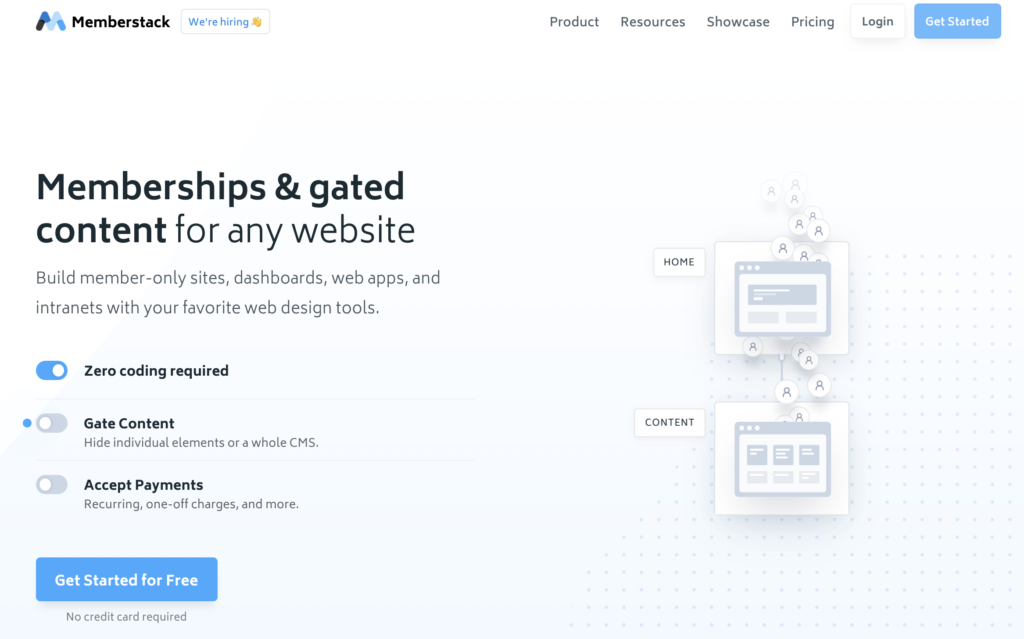
Memberstack is one of the two platforms listed here that aren't plugins for WordPress. It's a SaaS solution that provides the content protection and revenue collection while working with any website and content you've created anywhere. In other words, you don't have to create the content on their platform (like Podia below). You can create it on WordPress, on Wix, on Squarespace, or in HTML. It doesn't matter to them.
What I love about Memberstack is that it's pure and focused on what it is trying to do. It doesn't pick which content platform you're going to use. Because it's here to protect your content and charge people for it. That's it.
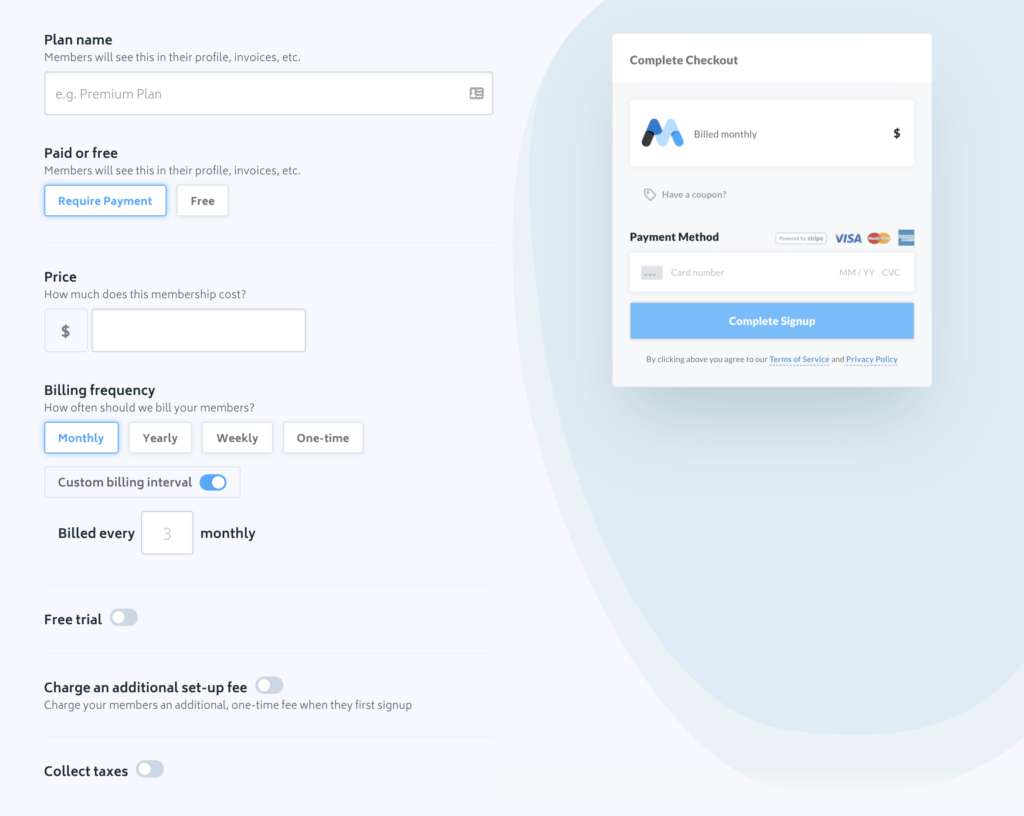
But just because it is clean and focused, don't mistake it for a partial solution.
- Create all sorts of custom fields for user profiles and collect the data at registration.
- It allows one-time and recurring payments.
- It integrates the member billing and account control panels into your site.
- Coupons are easy to create.
- One of the coolest things is that it supports customer-specific pages.
- It supports integration with Zapier for anything I forgot.
Pricing starts at $25/month and adjusts based on total members and revenue.
2. Podia

Podia is the other non-WordPress plugin that made the list. They've built a seriously awesome platform worth investigating. Unlike the earlier hosted eLearning platforms that I didn't include in this list, Podia didn't just add memberships as an extra component to their online course platform. This is a platform that clearly feels like it was designed for memberships.
While Memberstack still feels like you're building a membership site, Podia feels like they you're configuring payments, coupons, and content. In other words, you won't feel like you are building anything. It's all done already.
Podia is a full and complete solution for your membership site:
- It collects payments from both PayPal and Stripe.
- It integrates with ConvertKit, ActiveCampaign, MailChimp and more.
- More importantly, it provides its own email system (so you may not need the others).
- Speaking of emails, you can automatically notify members of new content when it's added.
- You can schedule content to delay it's posting.
- Coupon creation is easy, as is embedding video, and digital downloads.
But more than all of that, there are three things to note about Podia that helps it stand out.
- You don't need to manage hosting or update any plugins
- You can create courses, run webinars, and sell digital products – all on the same platform
- Things that normally have cost elsewhere (marketing automation, messaging tools, etc) are included on this platform
3. AccessAlly

If you're using WordPress, and are looking for a plugin, then the first one I'll tell you to look at is AccessAlly. There are others. And the others are awesome. But none of them are as complete as AccessAlly. None of them think as holistically as AccessAlly when it comes to you or your members.
The first thing to note is that AccessAlly talks about courses more than anything else. But you can easily use their course creation wizard for membership plans. Nothing is specific to courses, even if the wording is specific.
What I love most about their approach is how it differs from everyone else who builds membership plugins. Let's dig in here a bit.
Most membership plugins have you create plans (and name them). You can then price them and use them to restrict your content. Sounds right, right? But what you just did was to create a linear link between your protected content and the product you were selling. I know that's going to sound strange because it's so common. But everyone has you do the same. Create a plan, price it, and sell it.
There is absolutely no abstraction between the plan and the product. Until AccessAlly steps into the game.
Before I explain how they do it, let's talk about Taco Bell. They sell you beans, cheese, meat, and tortillas, right? Name the product? Oh right. You can't because there's an abstraction between the ingredients and the product. They craft several different products using the same ingredients.
Shouldn't you be able to do the same thing? AccessAlly may or may not like the Taco Bell reference, or Taco Bell for that matter. But I think it applies.
In AccessAlly you can easily create content in groups (courses, course modules, etc) and then assign them to products. But you can then create offers for those products. Or offers for a single product. So you could offer a 1-time offer for a product, and a 4-month installment plan for a product, and a monthly offer for the product. Three offers, one product, lots of content.
I should also mention that they heavily use tags within their system, so you can open and close up access to content based on the tags that people have (which allows you to do a lot of cool things like give them access to advanced material if they've completed earlier material in a certain timeframe).
- Complete integration with external marketing automation systems like ActiveCampaign and ConvertKit
- Full integration with Stripe and PayPal
- Protected content, downloads, embedded videos all supported
- Upgrades, downgrades, payment plans, installments, and subscriptions
- Member directories unlike most WP membership plugins
- Coupons are easy and fast to create
I can't speak highly enough about their product. It's more expensive that the rest, but if you're serious, it's a serious contender.
AccessAlly has multiple plans, but you'll be fine with their Essentials plan at $82/month.
4. MemberPress
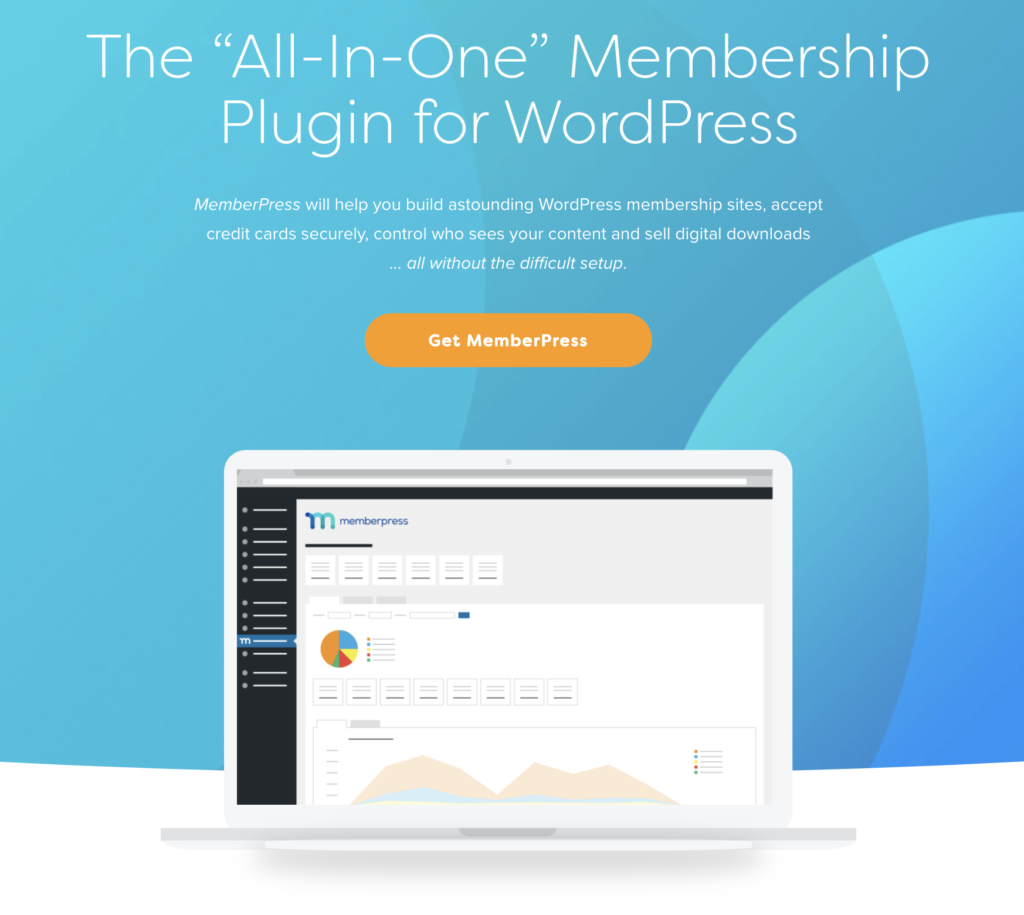
I've loved MemberPress since it came out. It seemed like they read my mind with every feature they rolled out. And for years it's been on the my short list every time I make a recommendation. In fact, if you're an agency working with customers, this is one of the two plugins I suggest you learn because of how often you'll use it on membership sites.
There's a lot that MemberPress gets right – including a really easy way to protect content you've already created on your WordPress site. You can create plans/levels that can protect content by just about any WordPress element – by post category, by page lineage (parents), by post type, by post tags, or by using shortcodes within any content. They provide additional extensions to help you lock down downloads hosted on AWS.
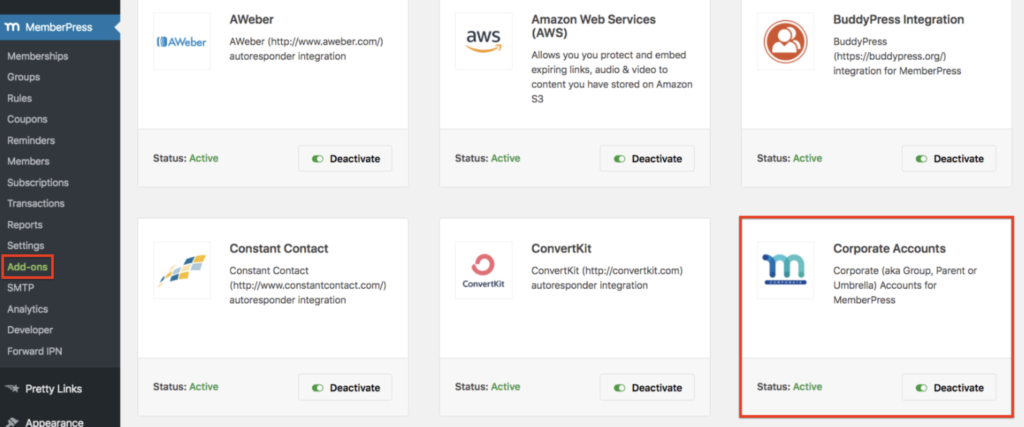
One thing that puts MemberPress ahead of most of the other WordPress plugins is the support for Corporate memberships. If you sell a membership that allows teams, organizations, departments – anything when a single membership allows for others to register under that umbrella, then MemberPress is for you.
If you're building a membership site on WordPress, you'll love their features:
- Content protection that includes scheduling (dripping) access
- Support for Teams / Corporate memberships
- Complete subscription support with upgrades and downgrades
- Full support for Stripe, PayPal and Authorize.net
- Coupons are fast and easy to create
- Full integration with several marketing automation solutions
5. WP Fusion
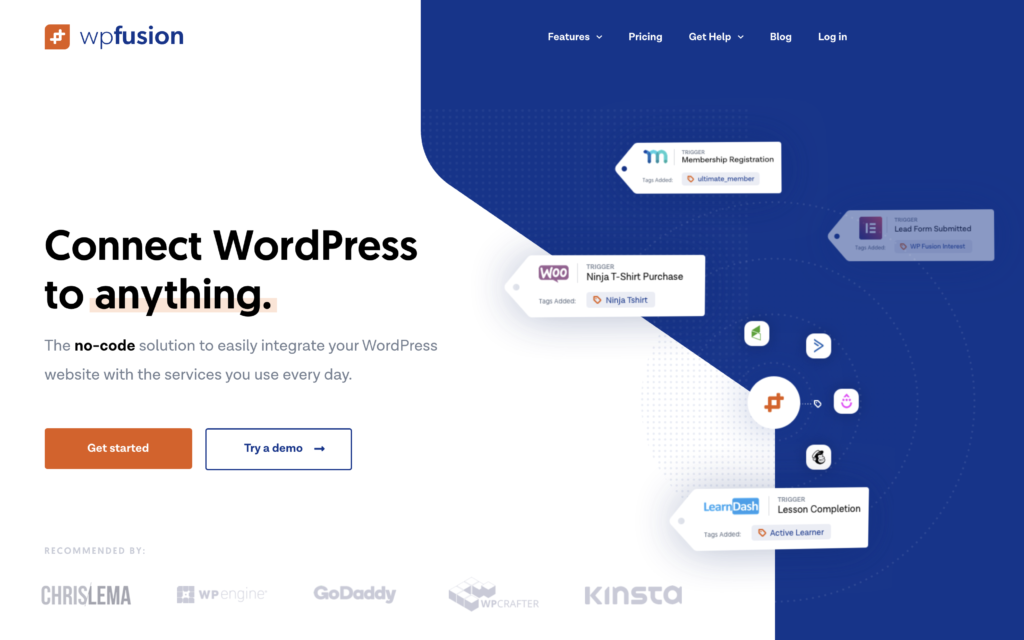
Here's what you need to know about WP Fusion – if you're building a membership site that leverages your marketing automation platform for most of the logic, then this lightweight solution to content protection is a heavyweight for your membership site. Let me explain.
WP Fusion isn't a membership plugin. It's a solution for integration. It connects your site with your marketing automation solutions like ActiveCampaign to pass tags back and forth. So if someone accomplishes something on your site (joins a membership, orders a product, completes a lesson), it can attach a new tag to the customer in AC. Then, as they come back to your site, it pulls all the tags from AC, so that your site can change its behavior based on those tags.
I'm using ActiveCampaign as an example. You can do it with ConvertKit or any other solution they integrate with. But the logic is the same. So the more you do with tags and custom fields within your marketing automation solution, the more your site can hide or show protected content.
- Prospect fills out a form – you use WP Fusion to create a lead in ActiveCampaign
- Prospect registers for an upcoming webinar – WP Fusion adds tags to the user
- Visitor buys a membership plan sold by MemberPress or WooCommerce – WP Fusion tags the user to the membership plan
- You can now limit which pages and posts can by shown based on logged in user tags using WP Fusion
- Customer completes two modules and WP Fusion tags the customer as “lesson two complete” which AC uses to add another tag “speedy”
- Customer now gets access to bonus material based on the “speedy” tag
If that scenario sounds a bit like what you can do with AccessAlly (above), it's because it is. The difference here is that you have to do a bit more work. You're the architect of the solution.
But that's exactly what you want if you're creating a custom solution. And that's when I use WP Fusion – when the scenario has some custom logic and only needs simple protection (show / don't show).
6. Restrict Content Pro
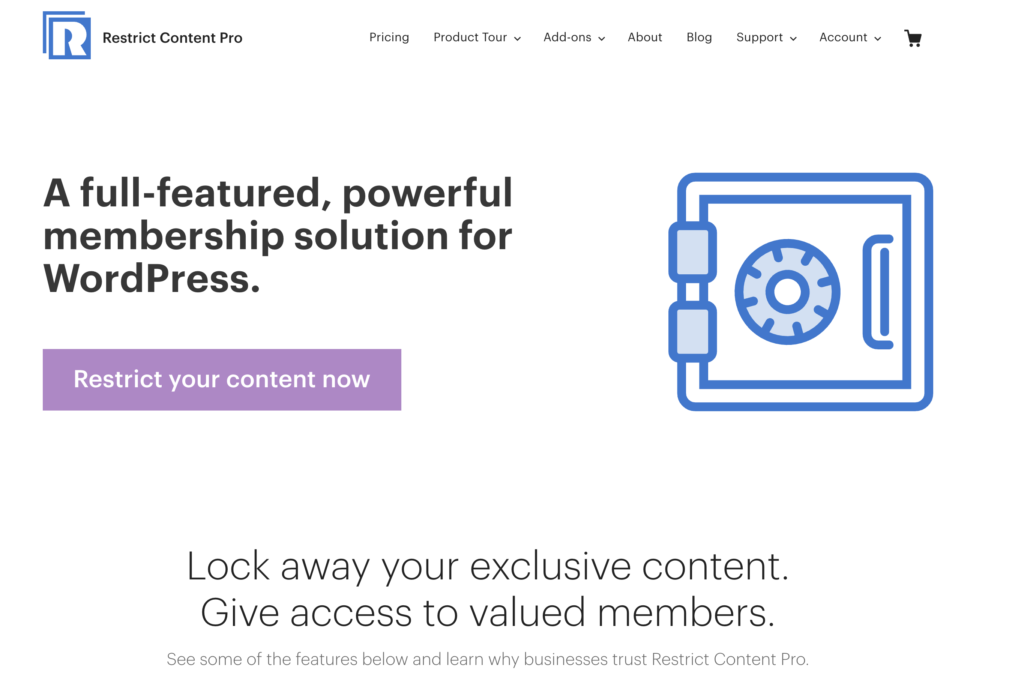
A few years ago I could only recommend Restrict Content Pro in a very specific set of circumstances. But that all changed in the last year. The team behind RCP has invested a lot of time to create a powerful plugin for membership sites and if you find yourself in any of the following situations, they are likely a perfect fit for you.
- Do you need corporate memberships like I mentioned above? RCP supports this scenario.
- Want to limit access to older content that was published before a member signed up? This is easy with RCP.
- Are you trying to sell customers websites – such that each purchaser gets access to a multisite site instance?
(if nothing in that question made sense, you can easily skip this one…) - Do you need the membership to expire on a specific date (like Dec 31st) regardless of when they signed up? No issue.
Restrict Content Pro has kept the user experience simple to navigate. They've created a ton of extensions that you only need to use if you face specific situations, keeping the overall code lightweight. And because the team who wrote it know WordPress well, programmers can easily extend the plugin.
You'll want the Professional plan for $249/year to get all the add-ons.
7. Paid Memberships Pro
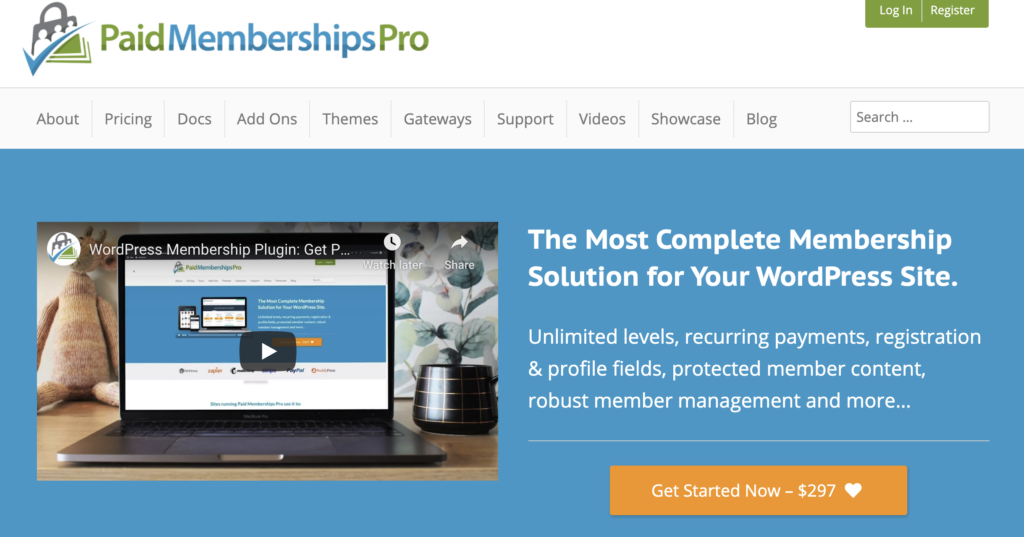
Paid Memberships Pro is the only plugin in this list that you can install and run your site on for free. Of course, when you see what you get for $297 (their plus plan), you might seriously consider buying it. But let's get into why it made the list.
First, I don't think I know anyone who knows association websites as well as the team behind Paid Memberships Pro. Association websites aren't the same as other membership sites. They may or may not need a lot of protected content, but they have deep needs for member directories, events and ticketing, custom fields for profiles, calendars, membership renewal timelines, and more. And while any plugin could likely be made to work with sites like that, PMP does it with ease.
Years ago I reviewed Paid Memberships Pro and talked about the extensive code snippets that Jason and his team had created. But when you write “code snippets” it suggests you need to be a programmer to use them. At the time I felt the product tilted in that direction. But in recent iterations the product has now brought those add-ons into the interface for people to simply activate, which makes it more approachable for more folks.
The Paid Memberships Pro plugin is great. But it's the support and commitment to making your site work that takes it to a whole different level.
- It delivers what you need for subscriptions with multiple payment gateways – more than almost all the others.
- You'll have no issues with custom fields for profiles – presented at registration
- When you sign up for the Plus plan, you get 64 extra add-on features
That last line hides so much. Remember when I told you they understood association websites. So one thing association sites need is profile pages. Take a look at this single add-on to see what I'm talking about when I say they know what they're doing and they provide a ton of value with each of these add-ons.
If you're an agency building a membership site, I told you to learn MemberPress as one of the two plugins you would end up using a lot. Paid Memberships Pro is the other one.
I suggest you purchase the Plus plan for $247 / year.
8. Wishlist Member
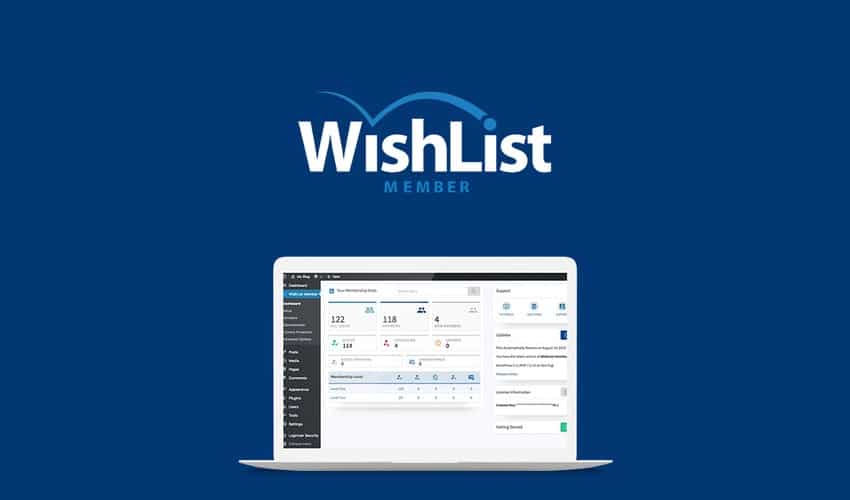
If you've been reading my blog lately, you might recall that just a couple months ago, I wrote a review about Wishlist Member. In it I highlighted that this old plugin had been completely rewritten and was coming out on top because of some of it's features, like automations and pay per post. Since I've covered the plugin in detail, let's jump into summary.
- The plugin supports multiple membership plans (they call them levels)
- You can collect funds with a massive number of payment gateways (the most on this list):
- PayPal, Stripe, Authorize.net
- Infusionsoft & ClickBank
- Recurly
- 1ShoppingCart, eWAY, JVZoo, PayBlue, 2Checkout, UltraCart
- PayKickstart, ThriveCart, SamCart and more
- They integration with a massive number of marketing automation solutions:
- Mailchimp, ConvertKit, Drip, ActiveCampaign
- AWeber, Constant Contact, GetResponse, iContact
- Infusionsoft, Maropost, Ontraport and more
- Supports Pay per Post (which most others don't)
- Ability to create custom user-specific pages
That's a big list of features for a plugin that some folks had completely written off. Well I'm here to tell you it belongs on the relatively short list.
You can purchase Wishlist Member for $147/year.
Conclusion
There has never been a better time to build a membership site. Ever. And if you're going to do it, I have one last thing to suggest.
Membership sites are different than normal sites because the user doesn't just view the content. They log into the site. And that normally kills the caching that most hosting companies set up to make sites fast. Because of that, members will notice your site slowing down if you use a host that counts on caching as their solution to high performance. Thankfully, I am pretty committed to membership sites, eLearning sites, and eCommerce stores. Because of that, I've worked with an entire product and engineering team at Nexcess and Liquid Web to create the fastest platform for membership sites. You really should check it out – starts at $19/month.
Picking the right plugin or platform is critical. So is picking the right host.
